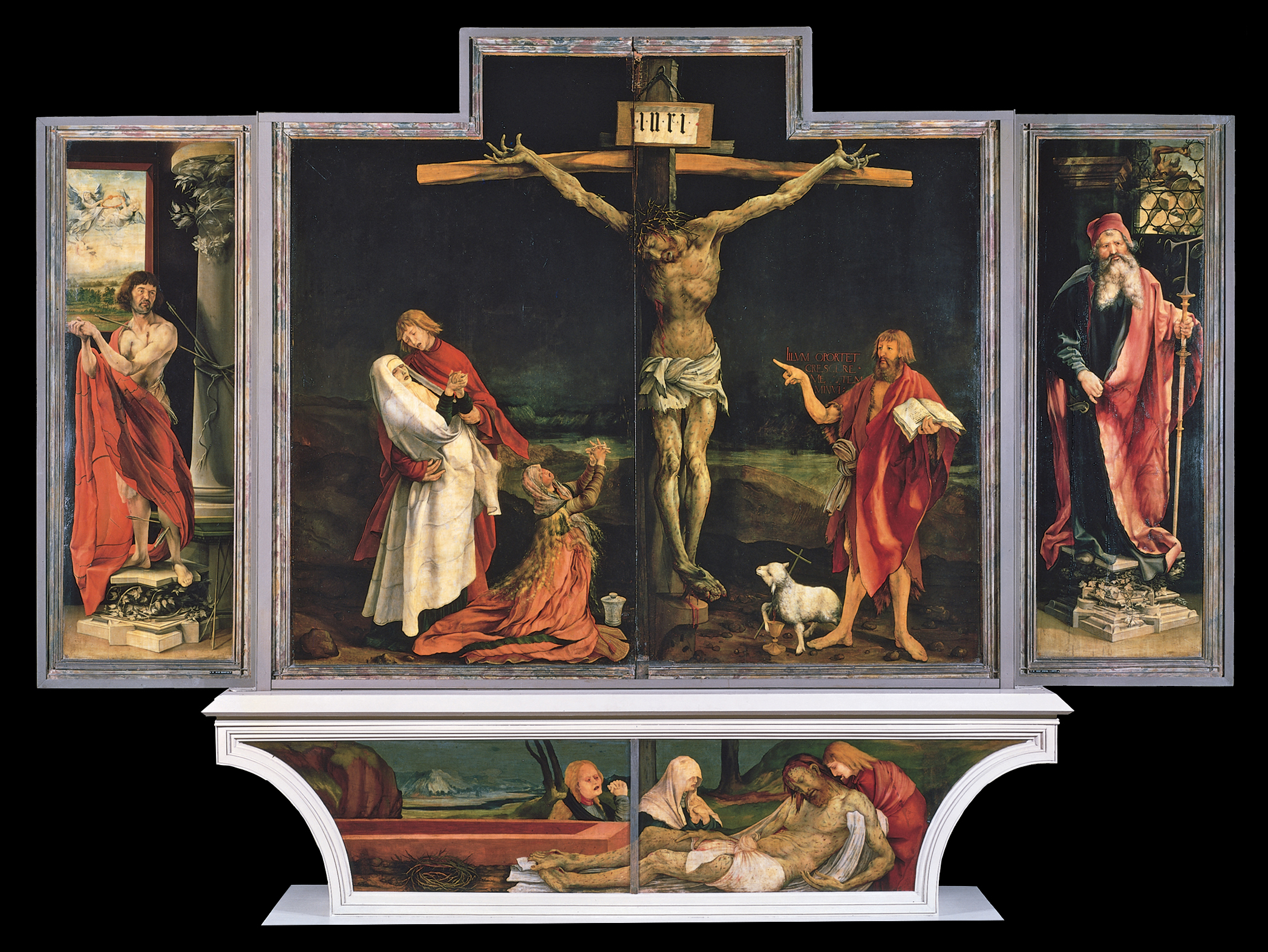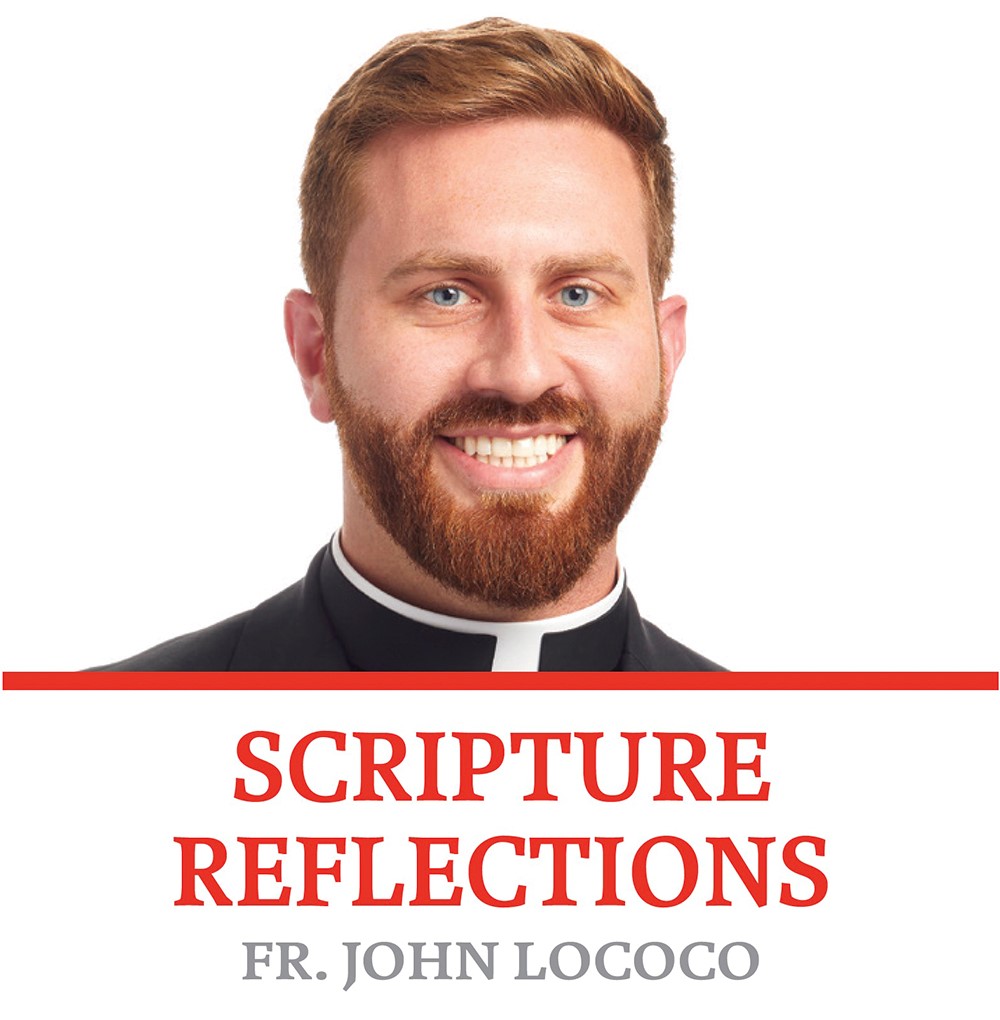Scripture Readings, Jan. 14, 2024

Detail from the Isenheim Altarpiece on display at the Unterlinden Museum at Colmar, Alsace, in France. (Wikimedia Commons)
January 14, 2024
Second Sunday in Ordinary Time
1 Samuel 3:3b-10, 19
1 Corinthians 6:13c-15a, 17-20
John 1:35-42
Cleaning up from the Christmas Eve liturgy just a few weeks ago, I heard the small protestation of a little child, begging not to leave the very elaborate crèche designed by the parish. Like the little child, we also find ourselves peacefully drawn to the stillness of that night and the charming innocence of the Lord who comes to us as this tiny babe. However, the loveliness of this scene is not long considered. If you had the opportunity to attend Mass the day after Christmas on the Feast of St. Stephen, you might have been struck by the red vestment of the priest, symbolizing the bloody sacrifice of the protomartyr. In a sense, just hours removed from the stillness of the manger, the Church reminds us of the reality what it means to be a disciple of Christ: “If they persecuted me, they will also persecute you.” (John 15:20)
As we step forth from the Christmas season into Ordinary Time, we similarly might be tempted to linger at this scene. There on the shores of the sea of Galilee, we see our Lord begin to gather his first disciples, but more poignantly, we are given the commanding image of the Baptist, gesturing to his cousin, Jesus: “Behold, the Lamb of God.”
Drawing from this scene, consider later the depiction of the Baptist anachronistically included in the famed Isenheim Altarpiece (Matthias Grünewald, ca. 1512–16) in Colmar, Alsace, France. The altarpiece depicts in stark realness Christ’s body from the cross, contorted in pain and plague-ridden. On his left, we see the Baptist gesturing as he once did years before to the Lamb of God who takes away the sins of the world. The last prophet who announced the coming of the Messiah is included here in this Calvary scene to emphasize the dynamic nature of what it means to follow Christ.
It is tempting in our own lives as Christians to subsist in spiritual autopilot. But the frustrating truth is that we are either drawing closer to or further from the Lord. Or more accurately, we are increasing or decreasing in our desires for him. In the Isenheim Altarpiece, we see St. John the Baptist framed by the words he spoke at his final witness, “He must increase, I must decrease.” (John 3:30) As our late Holy Father Pope Benedict XVI wrote, “Man was created for greatness — for God himself; he was created to be filled by God. But his heart is too small for the greatness to which it is destined. It must be stretched.”
We desperately want to stay with the Lord in these peaceful scenes — at the Nativity, at Cana, on the shores, in the hills — but the Lord is also inviting us into the more dynamic encounter of truly living as his disciple, truly following him. To bear this disposition in our heart, mind and soul, means grappling with the same question that Jesus asks the two disciples in the Gospel, “What are you looking for?” As the disciples will learn later, there are many who come to the Lord not knowing who they seek; they come in search of a prophet, a king, a teacher, a healer. But how does Jesus respond to this question that burns in the hearts of these disciples, of each one of us? “Come, and you will see.” At every moment of our journey of faith, following Jesus requires faith. He knows us and knows our hearts; he does not answer the question of the disciples; instead, he invites them into a relationship, one that demands trust and faith in him.
This can be daunting, especially when following the Lord means necessarily following him into what is unknown, unseen. We should not be afraid. Instead, we must assume the posture of Samuel who, when called upon by the Lord, simply responds, “Speak, for your servant is listening.” The docility that Samuel shows in patiently discerning the Lord’s voice and his will is rewarded: “Samuel grew up, and the Lord was with him, not permitting any word of his to be without effect.”
The Lord is not less generous than we are, friends. Whatever we give in small measure to the Lord — like an act of faith and trust in him — will be increased one hundredfold. St. Paul promises us today that, “whoever is joined to the Lord becomes one Spirit with him.” This is why the Baptist is able to be diminished before the Lord, to decrease so that the Lord might increase in him.
As we enter more steadily into this new year, come before the Lord and simply repeat the words of Samuel, “Speak, for your servant is listening.” Do not be surprised when the Lord refuses to meet you where you are, but instead invites you to follow him even more: “Come, and you will see.”
https://upload.wikimedia.org/wikipedia/commons/5/5f/Grunewald_Isenheim1.jpg

